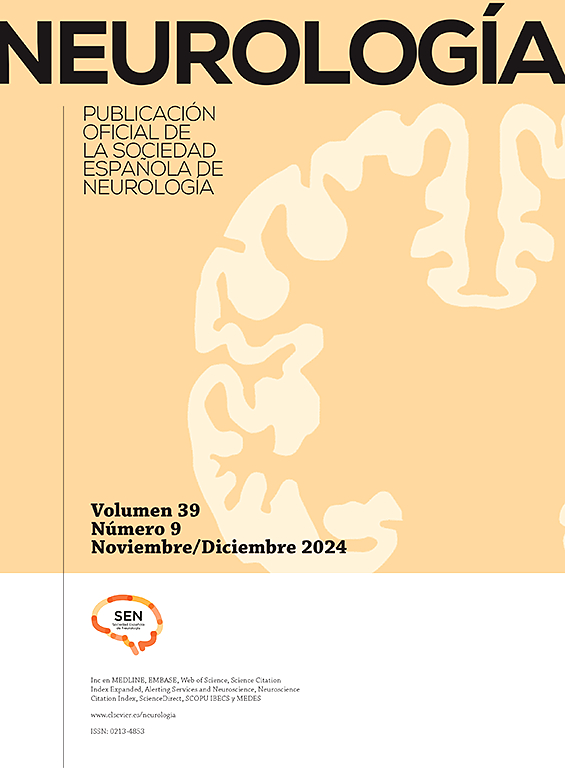源自西班牙的GRN的一种变体,具有异质表型
IF 3.1
4区 医学
Q2 CLINICAL NEUROLOGY
引用次数: 0
摘要
GRN基因中的c.1414-1G>;T变异曾被报道可能在美洲大陆的西班牙裔受试者中具有致病性。方法我们报告了5个西班牙裔携带该变异的家族,包括临床、神经影像学和实验室结果。结果两组患者的表型差异显著,包括表现为行为变异性额颞叶痴呆、语义变异性原发性进行性失语症、快速进行性运动神经元疾病(病理记录)和震颤主导型帕金森病。视网膜变性只在纯合子携带者中发现。体外剪接实验证实,突变c.1414-1G>;T影响外显子的剪接,导致外显子11缺失20个氨基酸。结论GRN基因c.1414-1G>;T变异具有致病性,可导致多种临床表现和基因剂量效应,可能具有西班牙方正效应。本文章由计算机程序翻译,如有差异,请以英文原文为准。
A variant in GRN of Spanish origin presenting with heterogeneous phenotypes
Introduction
The variant c.1414-1G>T in the GRN gene has previously been reported as probably pathogenic in subjects of Hispanic origin in the American continent.
Methods
We report 5 families of Spanish origin carrying this variant, including the clinical, neuroimaging, and laboratory findings.
Results
Phenotypes were strikingly different, including cases presenting with behavioral variant frontotemporal dementia, semantic variant primary progressive aphasia, rapidly progressive motor neuron disease (pathologically documented), and tremor-dominant parkinsonism. Retinal degeneration has been found in homozygous carriers only. Ex vivo splicing assays confirmed that the mutation c.1414-1G>T affects the splicing of the exon, causing a loss of 20 amino acids in exon 11.
Conclusions
We conclude that variant c.1414-1G>T of the GRN gene is pathogenic, can lead to a variety of clinical presentations and to gene dosage effect, and probably has a Spanish founder effect.
求助全文
通过发布文献求助,成功后即可免费获取论文全文。
去求助
来源期刊

Neurologia
医学-临床神经学
CiteScore
5.90
自引率
2.60%
发文量
135
审稿时长
48 days
期刊介绍:
Neurología es la revista oficial de la Sociedad Española de Neurología y publica, desde 1986 contribuciones científicas en el campo de la neurología clínica y experimental. Los contenidos de Neurología abarcan desde la neuroepidemiología, la clínica neurológica, la gestión y asistencia neurológica y la terapéutica, a la investigación básica en neurociencias aplicada a la neurología. Las áreas temáticas de la revistas incluyen la neurologia infantil, la neuropsicología, la neurorehabilitación y la neurogeriatría. Los artículos publicados en Neurología siguen un proceso de revisión por doble ciego a fin de que los trabajos sean seleccionados atendiendo a su calidad, originalidad e interés y así estén sometidos a un proceso de mejora. El formato de artículos incluye Editoriales, Originales, Revisiones y Cartas al Editor, Neurología es el vehículo de información científica de reconocida calidad en profesionales interesados en la neurología que utilizan el español, como demuestra su inclusión en los más prestigiosos y selectivos índices bibliográficos del mundo.
 求助内容:
求助内容: 应助结果提醒方式:
应助结果提醒方式:


